-
 Bitcoin
Bitcoin $83,726.8703
1.51% -
 Ethereum
Ethereum $1,873.4825
2.66% -
 Tether USDt
Tether USDt $0.9999
0.00% -
 XRP
XRP $2.1424
2.50% -
 BNB
BNB $614.0525
2.47% -
 Solana
Solana $127.4875
1.55% -
 USDC
USDC $1.0000
0.00% -
 Dogecoin
Dogecoin $0.1711
4.07% -
 Cardano
Cardano $0.6753
4.46% -
 TRON
TRON $0.2356
0.67% -
 Toncoin
Toncoin $4.0752
3.37% -
 Chainlink
Chainlink $14.0108
4.73% -
 UNUS SED LEO
UNUS SED LEO $9.3070
2.26% -
 Stellar
Stellar $0.2735
2.84% -
 Avalanche
Avalanche $19.4522
3.74% -
 Sui
Sui $2.3986
7.24% -
 Shiba Inu
Shiba Inu $0.0...01278
4.28% -
 Hedera
Hedera $0.1688
4.54% -
 Polkadot
Polkadot $4.2011
4.43% -
 Litecoin
Litecoin $84.4936
2.36% -
 MANTRA
MANTRA $6.2653
-0.44% -
 Bitcoin Cash
Bitcoin Cash $310.5827
3.37% -
 Bitget Token
Bitget Token $4.6047
3.16% -
 Dai
Dai $1.0001
0.02% -
 Ethena USDe
Ethena USDe $0.9998
-0.01% -
 Pi
Pi $0.7043
0.33% -
 Hyperliquid
Hyperliquid $13.4464
6.58% -
 Monero
Monero $216.9796
0.18% -
 Uniswap
Uniswap $6.1531
3.77% -
 Aptos
Aptos $5.3513
1.07%
How do I set transaction fees in Atomic Wallet?
In Atomic Wallet, transaction fees are set indirectly through priority levels like "Low" or "High," affecting confirmation speed and cost based on network conditions.
Mar 30, 2025 at 12:29 pm
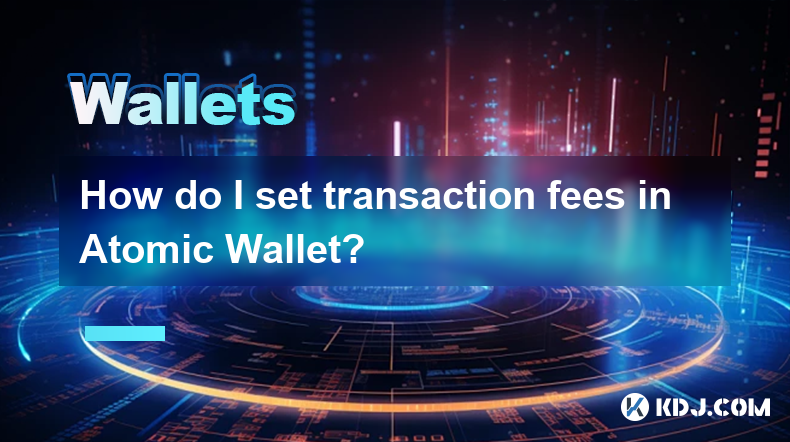
Understanding Transaction Fees in Atomic Wallet
Atomic Wallet, like other cryptocurrency wallets, charges transaction fees to process your transactions on the blockchain. These fees are paid to miners or validators who verify and add your transaction to the blockchain. The amount of the fee significantly impacts the speed at which your transaction is confirmed. Higher fees generally result in faster confirmation times. Understanding how to adjust these fees is crucial for efficient and cost-effective cryptocurrency management. The fees are denominated in the cryptocurrency you're sending, not a fixed fiat currency.
Setting Transaction Fees: A Step-by-Step Guide
The process of setting transaction fees in Atomic Wallet isn't directly controlled through a simple "fee" input field. Instead, it's managed indirectly through the selection of a priority level. Atomic Wallet offers several pre-set options that influence the transaction fee. This approach simplifies the process for users less familiar with the technical aspects of blockchain transaction fees. Here’s how you can adjust your transaction fees:
Open the Send Screen: Initiate a transaction as you normally would within Atomic Wallet. Navigate to the send screen for the specific cryptocurrency you wish to send.
Review the Default Fee: Before modifying anything, carefully review the default fee suggested by Atomic Wallet. This default is usually a balanced option, providing a reasonable confirmation time without excessively high fees.
Select the Priority Level: Atomic Wallet typically offers several priority levels, such as "Low," "Medium," "High," or similar options. Choosing "Low" will result in a lower fee but a potentially longer confirmation time. Conversely, "High" will charge a higher fee for faster confirmation. The specific labels might vary slightly depending on the cryptocurrency and Atomic Wallet updates.
Confirm the Transaction: Once you’ve selected your desired priority level (and thus indirectly set your transaction fee), review all transaction details, including the recipient address and the amount. Confirm the transaction to initiate the process.
Monitor the Transaction: After confirmation, you can track your transaction's progress within Atomic Wallet. The time it takes to confirm will depend on the network's congestion and the priority level you selected.
Factors Affecting Transaction Fees
Several factors influence the transaction fees you'll encounter in Atomic Wallet, even with the same priority level. These include:
Network Congestion: High network activity on the specific blockchain (e.g., Bitcoin, Ethereum) leads to increased competition for transaction processing, driving up fees. When the network is busy, even a "High" priority might take longer than usual.
Cryptocurrency Volatility: The value of the cryptocurrency itself fluctuates, directly affecting the fiat value of the transaction fee. A higher cryptocurrency price means a higher fee in terms of fiat currency.
Transaction Size: Larger transactions (in terms of data size) typically incur higher fees. This is because more computational power is needed to process them.
Atomic Wallet Updates: Atomic Wallet occasionally updates its fee estimation algorithms. This can lead to slight variations in the fees suggested for the same priority level over time.
Choosing the Right Transaction Fee
The optimal transaction fee is a balance between speed and cost. There's no universally "best" fee. Consider these points:
Time Sensitivity: If you need the transaction confirmed quickly (e.g., for a time-sensitive purchase), opt for a higher priority level and accept the higher fee.
Budget Constraints: If you're on a tight budget, choose a lower priority level, accepting a potentially longer confirmation time. It's important to balance your budget with the potential risks of slow confirmations.
Network Conditions: Monitor the network conditions before sending. If the network is congested, a higher priority might be necessary to ensure timely confirmation. Atomic Wallet may provide network status information to assist you.
Common Questions and Answers
Q: What happens if I choose a low priority and my transaction fails?
A: A low-priority transaction might take a considerable time to confirm, or it might fail altogether if the fee is insufficient to incentivize miners/validators to process it. The funds will generally remain in your Atomic Wallet. You can then try again with a higher priority.
Q: Can I manually input a specific transaction fee in Atomic Wallet?
A: No, Atomic Wallet does not allow for manual fee input. The system uses pre-set priority levels to indirectly manage transaction fees. This simplifies the process for users but limits precise fee control.
Q: Why are my transaction fees different each time I send cryptocurrency?
A: Transaction fees vary due to network congestion, cryptocurrency price fluctuations, transaction size, and Atomic Wallet's fee estimation algorithm updates. These factors are all dynamic and change constantly.
Q: Are the transaction fees in Atomic Wallet competitive compared to other wallets?
A: Atomic Wallet aims for competitive fees, but the actual fees depend on the factors mentioned above. Comparing fees across different wallets requires considering the same priority level and network conditions at the same time. Direct comparison isn't always straightforward.
Q: What cryptocurrencies support fee adjustments in Atomic Wallet?
A: Most cryptocurrencies supported by Atomic Wallet allow for fee adjustments through the priority level system. However, the specific options and their impact might vary slightly depending on the blockchain and its current state. Check the specific cryptocurrency's information within the Atomic Wallet interface.
Disclaimer:info@kdj.com
The information provided is not trading advice. kdj.com does not assume any responsibility for any investments made based on the information provided in this article. Cryptocurrencies are highly volatile and it is highly recommended that you invest with caution after thorough research!
If you believe that the content used on this website infringes your copyright, please contact us immediately (info@kdj.com) and we will delete it promptly.
- Pi Network (PI) Drops to $0.70-$0.80, But Technical Indicators Show Reversal Promise
- 2025-04-01 21:15:11
- Shiba Inu (SHIB) Price Prediction: Will the Meme Coin Rebound From Its Recent Decline?
- 2025-04-01 21:15:11
- 2025 is no doubt a year that has been anticipated to hold one of the most significant crypto bull runs
- 2025-04-01 21:10:12
- Bitcoin (BTC) Could Eat Away at the U.S. Dollar’s Reserve Status
- 2025-04-01 21:10:12
- Pi (PI) Token Had a Bearish Price Performance in March as It Has Declined Ever Since Hitting Its ATH in February
- 2025-04-01 21:05:12
- Crypto Market Has Started Accelerating Today with Bitcoin (BTC), Ethereum (ETH) and XRP Price Surging
- 2025-04-01 21:05:12
Related knowledge
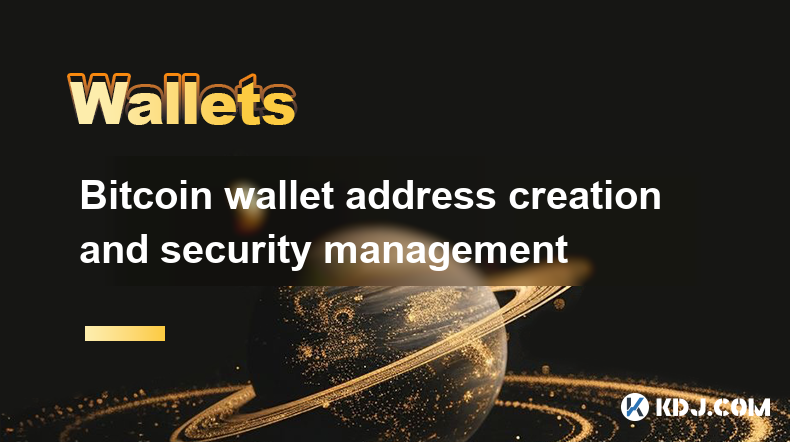
Bitcoin wallet address creation and security management
Mar 31,2025 at 10:56pm
Understanding Bitcoin Wallet AddressesA Bitcoin wallet doesn't store Bitcoin directly. Instead, it stores private keys which are long strings of characters. These keys grant access to your Bitcoin. Your public key, derived from the private key, is used to generate your Bitcoin wallet address, a unique identifier similar to a bank account number. This a...

How to easily generate a Bitcoin payment address
Mar 29,2025 at 10:49am
Generating a Bitcoin payment address might seem daunting, but it's actually quite straightforward. This process is crucial for receiving Bitcoin, as each transaction requires a unique address. Understanding how this works is fundamental to using Bitcoin effectively. This guide will walk you through the simple steps, regardless of your technical experti...
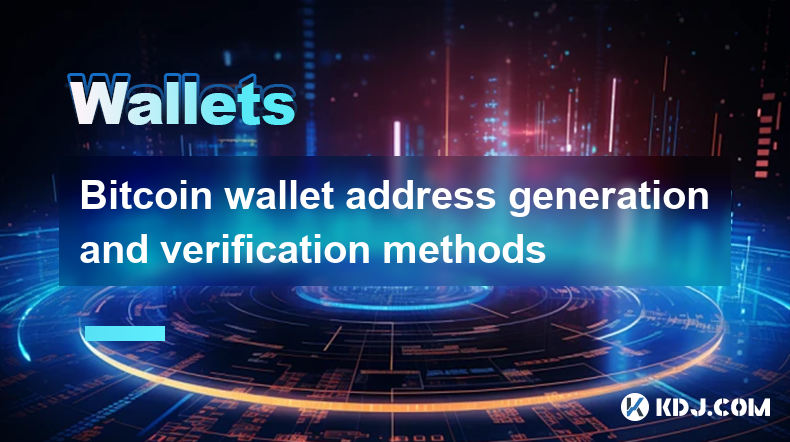
Bitcoin wallet address generation and verification methods
Apr 01,2025 at 11:01am
Understanding Bitcoin Wallet AddressesA Bitcoin wallet address is a unique identifier, similar to a bank account number, used to receive and send Bitcoin. It's a string of alphanumeric characters, crucial for participating in the Bitcoin network. Understanding how these addresses are generated and verified is paramount for secure Bitcoin transactions. ...
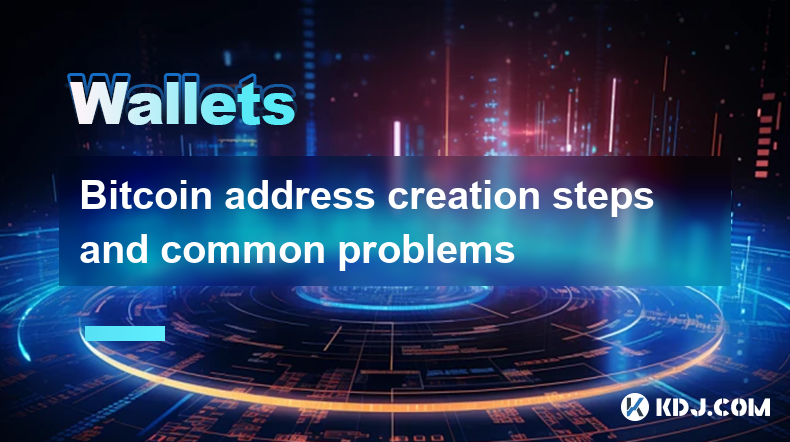
Bitcoin address creation steps and common problems
Mar 30,2025 at 06:07am
Understanding Bitcoin AddressesA Bitcoin address is a unique identifier, similar to a bank account number, used to receive Bitcoin. It's a string of alphanumeric characters generated from a public key, derived from your private key. Understanding the distinction between public and private keys is crucial for Bitcoin security. Your private key should be...
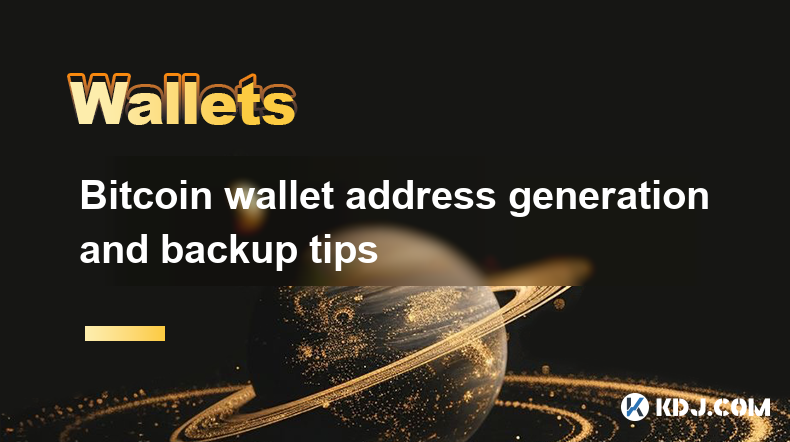
Bitcoin wallet address generation and backup tips
Apr 01,2025 at 05:00pm
Understanding Bitcoin Wallet AddressesA Bitcoin wallet address is essentially your unique identifier on the Bitcoin blockchain. It's a string of alphanumeric characters used to receive Bitcoin. Unlike bank accounts, you can have multiple addresses associated with a single wallet. These addresses are generated by your wallet software using cryptographic...
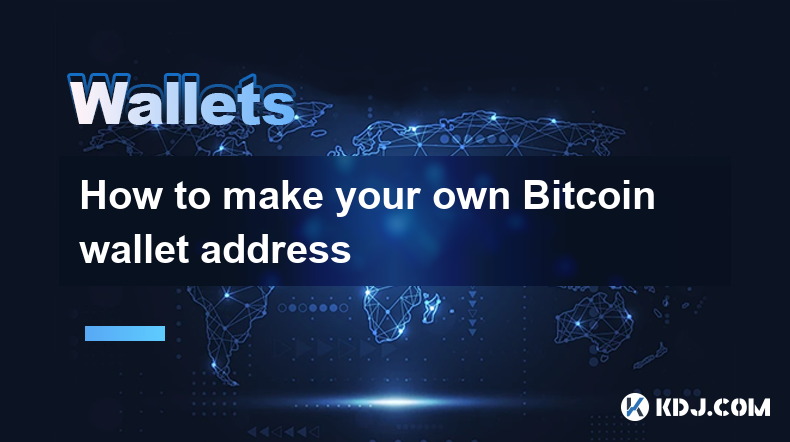
How to make your own Bitcoin wallet address
Mar 29,2025 at 08:42pm
Creating your own Bitcoin wallet address is crucial for securing and managing your Bitcoin holdings. It allows you to independently receive and send Bitcoin without relying on third-party services. This process involves understanding the different types of wallets and choosing the one that best suits your needs and technical expertise. Incorrectly gene...

Bitcoin wallet address creation and security management
Mar 31,2025 at 10:56pm
Understanding Bitcoin Wallet AddressesA Bitcoin wallet doesn't store Bitcoin directly. Instead, it stores private keys which are long strings of characters. These keys grant access to your Bitcoin. Your public key, derived from the private key, is used to generate your Bitcoin wallet address, a unique identifier similar to a bank account number. This a...

How to easily generate a Bitcoin payment address
Mar 29,2025 at 10:49am
Generating a Bitcoin payment address might seem daunting, but it's actually quite straightforward. This process is crucial for receiving Bitcoin, as each transaction requires a unique address. Understanding how this works is fundamental to using Bitcoin effectively. This guide will walk you through the simple steps, regardless of your technical experti...

Bitcoin wallet address generation and verification methods
Apr 01,2025 at 11:01am
Understanding Bitcoin Wallet AddressesA Bitcoin wallet address is a unique identifier, similar to a bank account number, used to receive and send Bitcoin. It's a string of alphanumeric characters, crucial for participating in the Bitcoin network. Understanding how these addresses are generated and verified is paramount for secure Bitcoin transactions. ...

Bitcoin address creation steps and common problems
Mar 30,2025 at 06:07am
Understanding Bitcoin AddressesA Bitcoin address is a unique identifier, similar to a bank account number, used to receive Bitcoin. It's a string of alphanumeric characters generated from a public key, derived from your private key. Understanding the distinction between public and private keys is crucial for Bitcoin security. Your private key should be...

Bitcoin wallet address generation and backup tips
Apr 01,2025 at 05:00pm
Understanding Bitcoin Wallet AddressesA Bitcoin wallet address is essentially your unique identifier on the Bitcoin blockchain. It's a string of alphanumeric characters used to receive Bitcoin. Unlike bank accounts, you can have multiple addresses associated with a single wallet. These addresses are generated by your wallet software using cryptographic...

How to make your own Bitcoin wallet address
Mar 29,2025 at 08:42pm
Creating your own Bitcoin wallet address is crucial for securing and managing your Bitcoin holdings. It allows you to independently receive and send Bitcoin without relying on third-party services. This process involves understanding the different types of wallets and choosing the one that best suits your needs and technical expertise. Incorrectly gene...
See all articles























































































